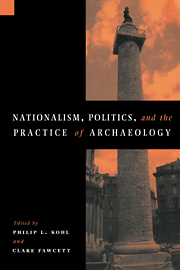Book contents
- Frontmatter
- Contents
- List of maps
- List of contributors
- Acknowledgments
- Part I Introduction
- Part II Western Europe
- Part III Eastern Europe and Eurasia
- Part IV East Asia
- Part V Commentary
- 15 Promised lands and chosen peoples: the politics and poetics of archaeological narrative
- 16 Romanticism, nationalism, and archaeology
- Bibliography
- Index
15 - Promised lands and chosen peoples: the politics and poetics of archaeological narrative
Published online by Cambridge University Press: 06 October 2009
- Frontmatter
- Contents
- List of maps
- List of contributors
- Acknowledgments
- Part I Introduction
- Part II Western Europe
- Part III Eastern Europe and Eurasia
- Part IV East Asia
- Part V Commentary
- 15 Promised lands and chosen peoples: the politics and poetics of archaeological narrative
- 16 Romanticism, nationalism, and archaeology
- Bibliography
- Index
Summary
As the essays in this volume demonstrate so clearly, images and symbols from the past play conspicuous and powerful roles in the present. In the many twentieth-century examples cited here by the authors, we can see how archaeological finds become battle-banners of modern ethnic groups and nations; how the dubious evidence of ancient ethnic migrations and diffusions can be used to legitimize modern territorial expansion and ethnic cleansing; how patterns of archaeological funding and scholarly interest can place interest on certain politically useful sites and certain classes of evidence; and how archaeological interpretation can often both reflect and reinforce the centralizing policies of emerging nation-states. Yet this chapter will attempt to show that such nationalist bias in archaeological research and interpretation is neither a regional aberration nor merely a curable symptom of an identifiable scholarly disease. It will argue that archaeology has by its nature an unavoidable political dimension – and that nationalism is simply one of many possible manifestations of its character as both a scientific and a political enterprise.
Although most of the chapters in this volume deal with regions with long historiographical traditions, where images of ancient enmity have fueled modern ethnic or political conflict, archaeology can also be seen to manifest its political character in superficially peaceful surroundings and “shallow” historical contexts.
- Type
- Chapter
- Information
- Nationalism, Politics and the Practice of Archaeology , pp. 249 - 262Publisher: Cambridge University PressPrint publication year: 1996
- 17
- Cited by

